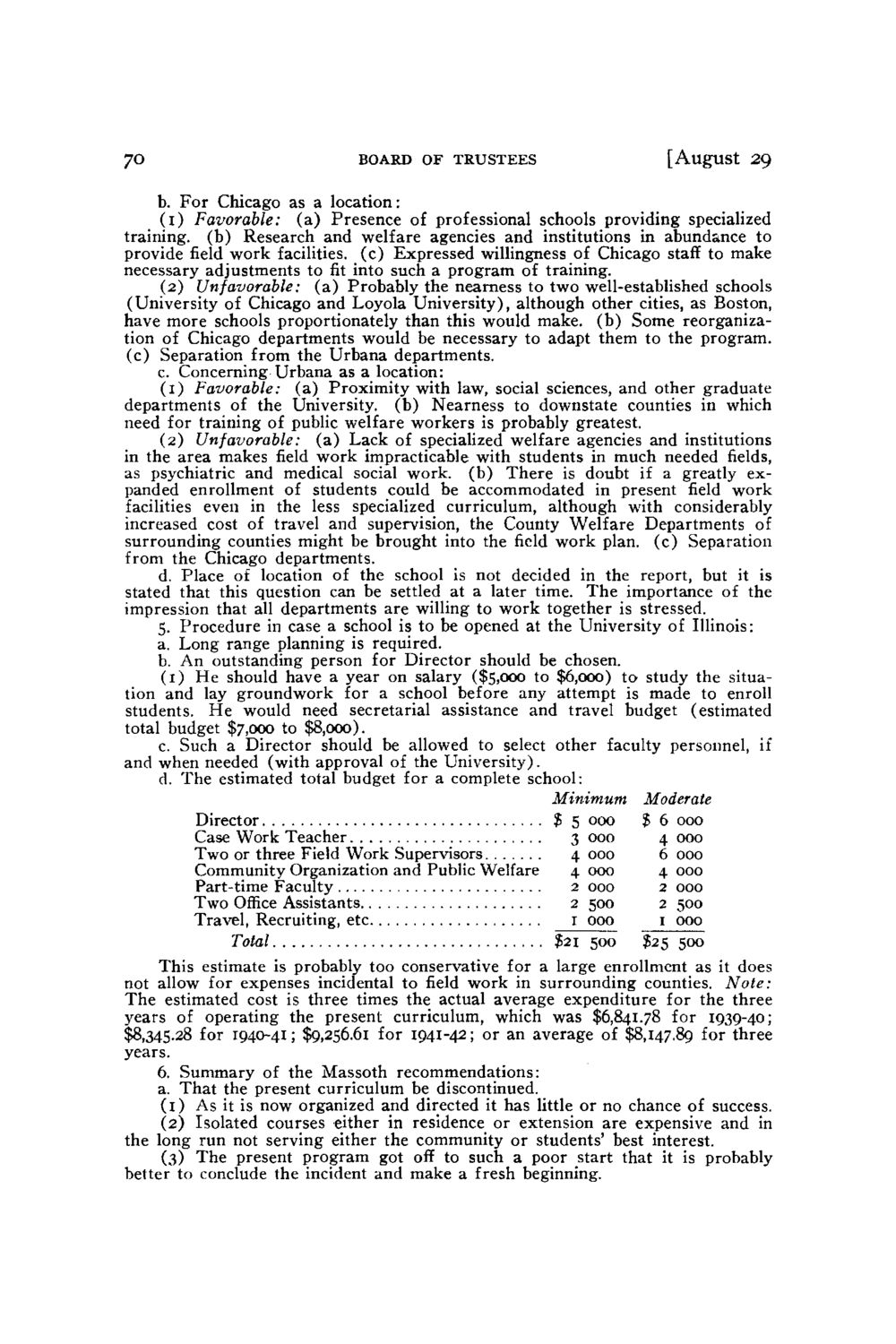| |
| |
Caption: Board of Trustees Minutes - 1944
This is a reduced-resolution page image for fast online browsing.

EXTRACTED TEXT FROM PAGE:
70 BOARD OF TRUSTEES [August 29 b. For Chicago as a location: (1) Favorable: ( a ) Presence of professional schools providing specialized training, (b) Research and welfare agencies and institutions in abundance to provide field work facilities, (c) Expressed willingness of Chicago staff to make necessary adjustments to fit into such a program of training. (2) Unfavorable: ( a ) Probably the nearness to two well-established schools (University of Chicago and Loyola University), although other cities, as Boston, have more schools proportionately than this would make, (b) Some reorganization of Chicago departments would be necessary to adapt them to the program. (c) Separation from the Urbana departments. c. Concerning Urbana as a location: (1) Favorable: (a) Proximity with law, social sciences, and other graduate departments of the University, (b) Nearness to downstate counties in which need for training of public welfare workers is probably greatest. (2) Unfavorable: (a) Lack of specialized welfare agencies and institutions in the area makes field work impracticable with students in much needed fields, as psychiatric and medical social work, (b) There is doubt if a greatly expanded enrollment of students could be accommodated in present field work facilities even in the less specialized curriculum, although with considerably increased cost of travel and supervision, the County Welfare Departments of surrounding counties might be brought into the field work plan, (c) Separation from the Chicago departments. d. Place of location of the school is not decided in the report, but it is stated that this question can be settled at a later time. T h e importance of the impression that all departments are willing to work together is stressed. 5. Procedure in case a school is to be opened at the University of Illinois: a. Long range planning is required. b. An outstanding person for Director should be chosen. (1) H e should have a year on salary ($5,000 to $6,000) to study the situation and lay groundwork for a school before any attempt is made to enroll students. H e would need secretarial assistance and travel budget (estimated total budget $7,000 to $8,000). c. Such a Director should be allowed to select other faculty personnel, if and when needed (with approval of the University). d. The estimated total budget for a complete school: Minimum Moderate Director $ 5 000 % 6 000 Case Work Teacher 3 000 4 000 Two or three Field Work Supervisors 4 000 6 000 Community Organization and Public Welfare 4 000 4 000 Part-time Faculty 2 000 2 000 Two Office Assistants 2 500 2 500 Travel, Recruiting, etc 1 000 1 000 Total $21 500 $25 500 This estimate is probably too conservative for a large enrollment as it does not allow for expenses incidental to field work in surrounding counties. Note: T h e estimated cost is three times the actual average expenditure for the three years of operating the present curriculum, which was $6,841.78 for 1939-40; $8,345.28 for 1940-41; $9,256.61 for 1941-42; or an average of $8,147.89 for three years. 6. Summary of the Massoth recommendations: a. That the present curriculum be discontinued. (1) As it is now organized and directed it has little or no chance of success. (2) Isolated courses either in residence or extension are expensive and in the long run not serving either the community or students' best interest. (3) T h e present program got off to such a poor start that it is probably better to conclude the incident and make a fresh beginning.
| |